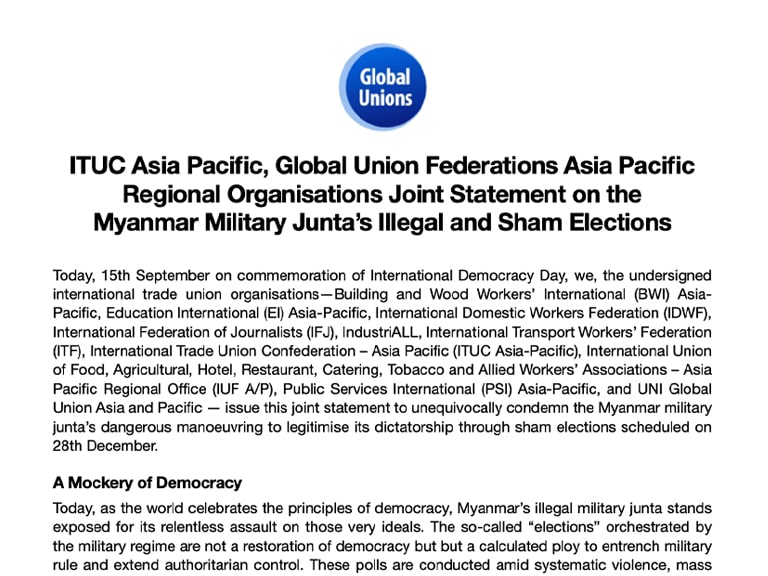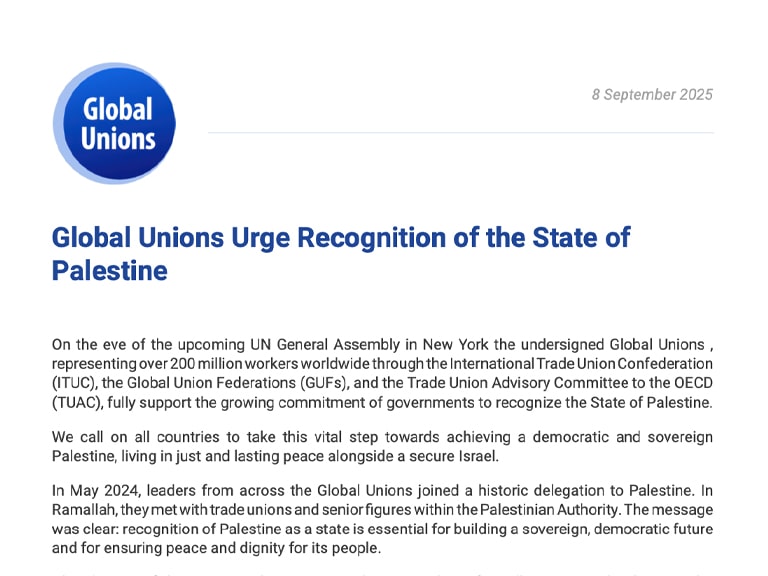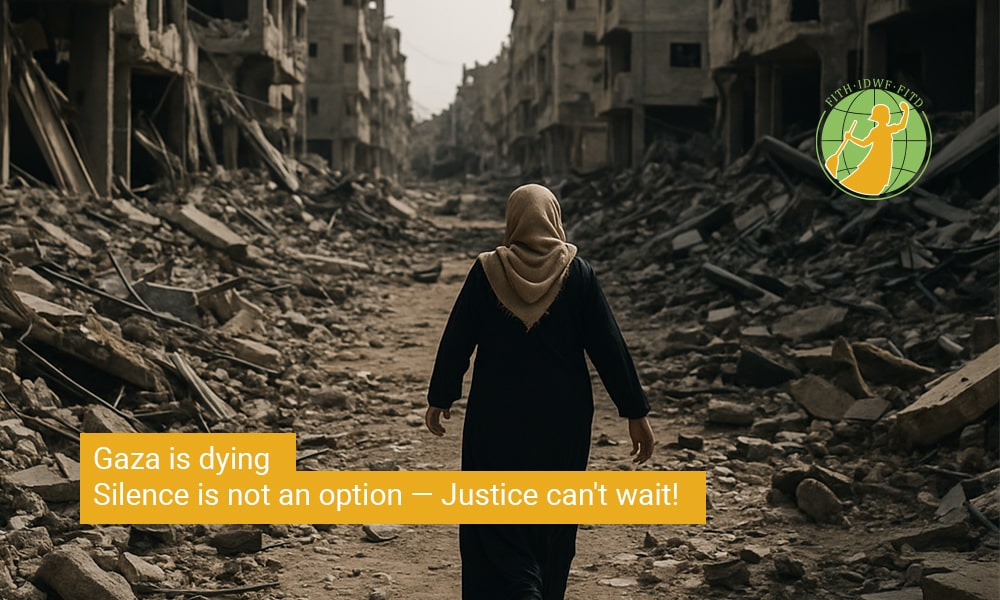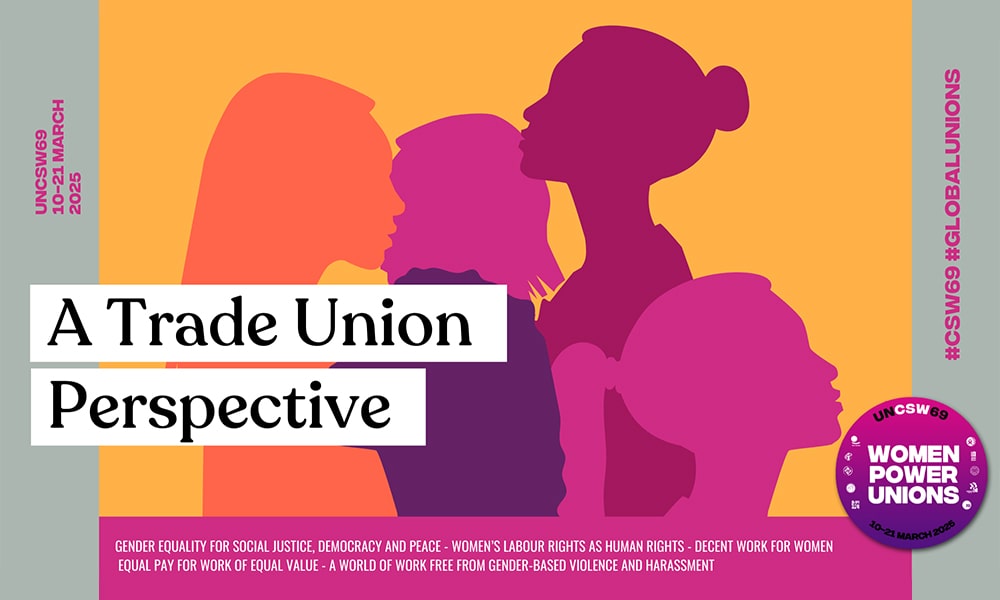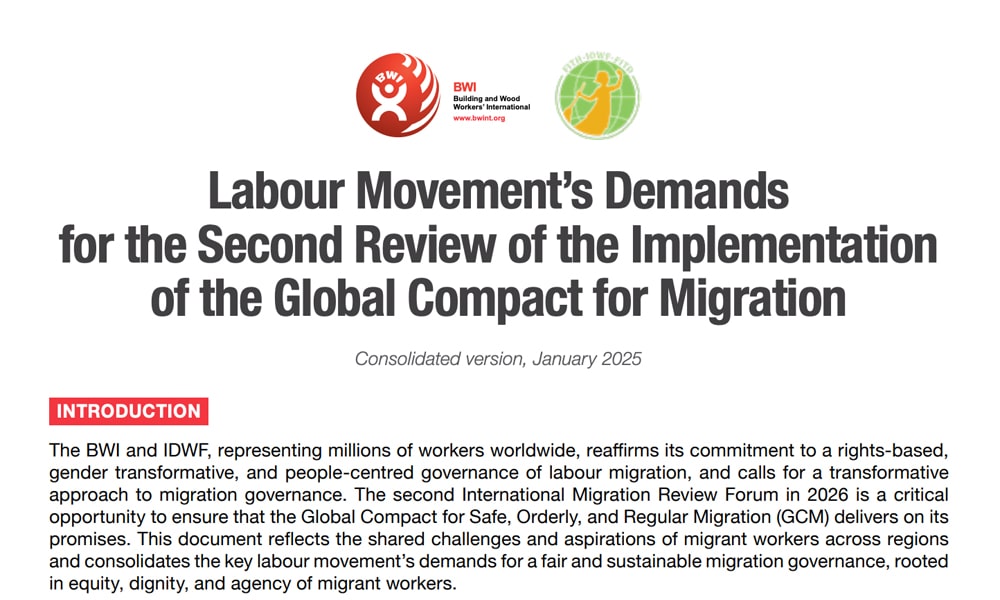UNCSW64 Global Unions Statement
Details
UNCSW64 Global Unions Statement
Submitted by: The International Trade Union Confederation (ITUC), Education International (EI), Public Services International (PSI), UNI Global Union, International Transport Workers’ Federation (ITF), International Federation of Journalist (IFJ), International Domestic Workers Federation (IDWF)
Global Unions call for bold commitments in advancing the Beijing Declaration and Platform for Action and the human rights of women throughout the lifecycle
2020 provides an extraordinary, generational opportunity to reinvigorate the unfulfilled promise of the Beijing Declaration and Platform for Action (BPfA). Agreed a quarter of a century ago, the BPfA remains the enduring blue-print for achieving gender equality. The political declaration that will be adopted by governments at the 64th session of the Commission on the Status of Women must be ambitious and forward looking. It must acknowledge current global threats, whether to peace and democracy, to the environment, to human rights, to workers’ rights or to women’s rights. It must offer up a progressive and feminist vision to counter these threats and resume the advance towards gender equality and social justice, rooted in the implementation of the Platform for Action and the 2030 Agenda for Sustainable Development.
Conscious of our changing world of work and the centrality of decent work to women’s economic independence and autonomy, trade unions are committed to a transformational agenda advancing women’s leadership and defending the rights of women workers.
We propose that the aspirations of the BPfA can be made real by action on four key axes:
- Guarantee the fundamental human rights of freedom of association and collective bargaining of all women workers;
- Invest in care for gender equality and development, to redistribute the burden of unpaid care; work, to ensure access to quality public services and to create millions of quality green jobs;
- Eliminate gender-based violence and harassment in the world of work;
- Promote women in leadership through a feminist approach to leadership.
The Global Context:
Attacks on civil rights and liberties, including trade union rights, are a significant and growing obstacle to women’s ability and opportunity to organise to change their working realities. The majority of the world’s workers, particularly women, disabled workers and migrant and domestic workers, are disenfranchised of their rights to freedom of association at work. That disenfranchisement is the result of many factors, including: the failure of economic policies to reduce poverty and economic inequality; the increasing power of large multinational corporations, and corresponding failure by States to effectively regulate and enforce norms and standards against them; the fragmentation of the workplace and employment relationships; and the diffusion of employer responsibilities across a range of actors (as recognised by Maina Kiai, former UN Special Rapporteur on the rights to freedom of peaceful assembly and of association).
Women’s progress in the world of work is shackled by gender-based violence and harassment, multiple forms of discrimination and intersecting systems of oppression based on class, race, migration status, sexual orientation and gender identity. Women’s global labour force participation stands at 48.5 per cent, 26.5 percentage points below that of men. Women are still overrepresented in low-paying, insecure, involuntary part-time, informal work and survival activities.
Horizontal and vertical occupational segregation remain a persistent feature of labour markets and the global gender pay gap is stubborn at around 20 per cent. At current rates of progress, the gender pay gap will not be closed before 2069. An even wider gender pensions gap is taking root, estimated at between 30 – 40 per cent.
New forms of work organisation such as digital platform work coupled with the deregulation of the employment relationship are making work more precarious and informal, impacting the employment conditions of women and young people in particular. The development of new technologies potentially perpetuates and further exacerbates existing discrimination and inequalities, as does the unregulated development of the gig economy.
Gender-based violence and harassment pervades the world of work, affecting all sectors and occupations. Online harassment is a growing problem for women who tend to be disproportionately targeted for abuse. The way women are portrayed in the media influences public perception of women’s role in society and almost one in two women journalists have experienced online abuse.
Worldwide, more than half of the global population has no social protection coverage, and less than 30 per cent enjoy comprehensive social protection. Women are disadvantaged in social protection systems, experiencing lower coverage rates and substantially lower benefit levels, especially with regard to maternity protection, retirement pensions, unemployment benefits, occupational injury and accident compensation schemes and survivors’ benefits.
Women perform 76.2 per cent of the total hours of unpaid care work – more than three times as much as men. This work is invisible in the System of National Accounts and measurements of Gross Domestic Product yet presents a major obstacle to women’s emancipation whilst contributing trillions of dollars to the global economy.
Austerity measures and the privatisation of public services including health and social care, education, transport, electricity, water and sanitation have had disproportionately negative impacts on women’s human rights and have increased gender gaps in employment and social protection. Current deficits in the quality and provision of care services will create a severe and unsustainable global care crisis and increase gender inequalities at work, if not adequately addressed. Care workers – the majority of whom are women, and disproportionately migrant women and women of colour – too often experience discrimination, job insecurity, including zero-hours contracts, low pay, poor working conditions and violence and harassment at work.
Over 100 million people could be pushed into extreme poverty as a result of climate change by 2030. Women are particularly at risk of climate change induced poverty, given their existing exclusion from decent jobs and social protection systems that can help mitigate the impacts.
Although there has been considerable progress towards achieving gender equality in education since the adoption of BPfA, many obstacles still prevent girls and women from fully enjoying their right to quality public education. These include poverty, pregnancy, early marriage, gender-based violence, migration and refugee status. In addition, the persistence of patriarchal gendered social norms means that in most countries, girls are more than twice as likely to do child domestic work as boys, thus reducing the possibilities for girls to go to school, and women’s ability to transition successfully from education into decent work. Only two in three countries have achieved parity in primary, one in two in lower secondary, and one in four in upper secondary education enrolment. 117 countries and territories still allow children to marry, and only 44% of all States prohibit discrimination within education based on sex or gender. Access to the right to education for women and girls is additionally curtailed by armed conflict and the global climate emergency.
Change is Urgent:
States must deliver on the promise of critical areas of concern outlined in the BPfA, which includes a focus on women and the economy, the education and training of women, as well as the rights of the girl child. States must ratify and implement the UN Convention on the Elimination of all forms of Discrimination against Women, which is the only legally-binding text that guarantees equal rights between women and men in all areas, including equal right to education, equal rights within education and equal rights through education. This must be linked to urgent State action to accelerate progress towards the achievement of
SDG8 on decent work, SDG5 on gender and SDG4 on education and vocational training. Full gender equality in education, labour market, economic and social policies and structures can only be achieved through systemic change. Gender analysis can shed a light on the full range of gender-based and intersecting barriers that prevent women from enjoying their full economic, social, cultural and political rights, including their rights to education throughout the life cycle.
To take serious action to advance the BPfA, States must:
Respect and promote the rights to freedom of association, peaceful assembly and collective bargaining.
- Ratify all relevant international and regional human rights instruments that guarantee the rights to freedom of and collective bargaining, including ILO Conventions 87, 98, 151 and 154 and ensure that the right to freedom of association and the right to organise can be exercised by everyone without discrimination;
- Actively create an enabling environment for workers to establish independent trade unions and engage in collective bargaining;
- Support tripartite social dialogue between government, employers and trade unions to prevent and remove barriers to gender equality;
- Support the negotiation, signing and implementation of Global Framework Agreements between transnational companies and Global Unions, and mandate that businesses perform gender focused due diligence with respect to human rights throughout their global supply chains.
Invest in care to promote gender equality and avert a global care crisis:
- Commit a minimum of two per cent of national income to investment in quality public care services;
- Adopt gender-responsive macro-economic policies by securing fiscal space for investments in gender responsive quality public services, public social protection systems and sustainable infrastructure and reverse the expansion of corporate power, which is enabled through the use of tax incentives, public-private partnerships, tax evasion and trade agreements on public services;
- Remove gender bias from macro-economic policymaking, including through recognising and valuing unpaid care and domestic work in the System of National Accounts;
- Enact laws and implement policies to facilitate the reconciliation of work and private life including through ratification and implementation of ILO Conventions 183 on maternity protection and 156 on Workers with Family Responsibilities. Mandate paid parental and family leave and provide pension care credits for time spent out of the labour force to raise children/care
for dependents; - Integrate gender perspectives into urban and rural planning and expand public transport to provide women with safe, equal access to public services including education, childcare and healthcare and to their place of work;
- Invest in gender-responsive social protection systems that guarantee universal access to essential health care, access to basic pensions and guaranteed minimum unemployment benefits;
- Address the over-representation of women in precarious employment, low wage employment, and the informal economy by adopting measures that ensure universal access to a living wage and social protection. This includes an evidence-based and regularly adjusted statutory national minimum living wage, as well as programmes to facilitate access to formal employment and to ensure informal workers have access to social protections in line with ILO Recommendation 204;
- Implement laws, policies and programmes to address both horizontal and vertical occupational segregation and secure equal pay for work of equal value in line with ILO Convention 100 on equal remuneration;
- Adopt measures to improve women’s access to quality vocational education and training; and just transition measures for women workers affected by climate change, digitalisation, and automation.
Eliminate gender-based violence and discrimination in the world of work:
- Ratify and effectively implement the ILO Violence and Harassment Convention (C190) and Recommendation 206, through law, policy and collective bargaining. Particular attention should be paid to sectors or occupations that are more exposed to gender-based violence and harassment, such as hospitality, health and social services, transport, education, media sectors,
domestic work and informal work; - Promote workplace policies to address the impacts of domestic violence in the world of work, such as paid domestic violence leave, adjustments to working patterns and access to counselling services for victims of domestic violence;
- Enact laws and policies to prevent, address and redress gender-based discrimination in line with ILO Convention 111 on discrimination in employment and occupation. This must include measures to prevent and dismantle discrimination rooted in intersecting systems of oppression based on class, gender, race, sexual orientation and gender identity and migrant status.
UN Convention on the Elimination of all forms of Discrimination against Women
Download here

